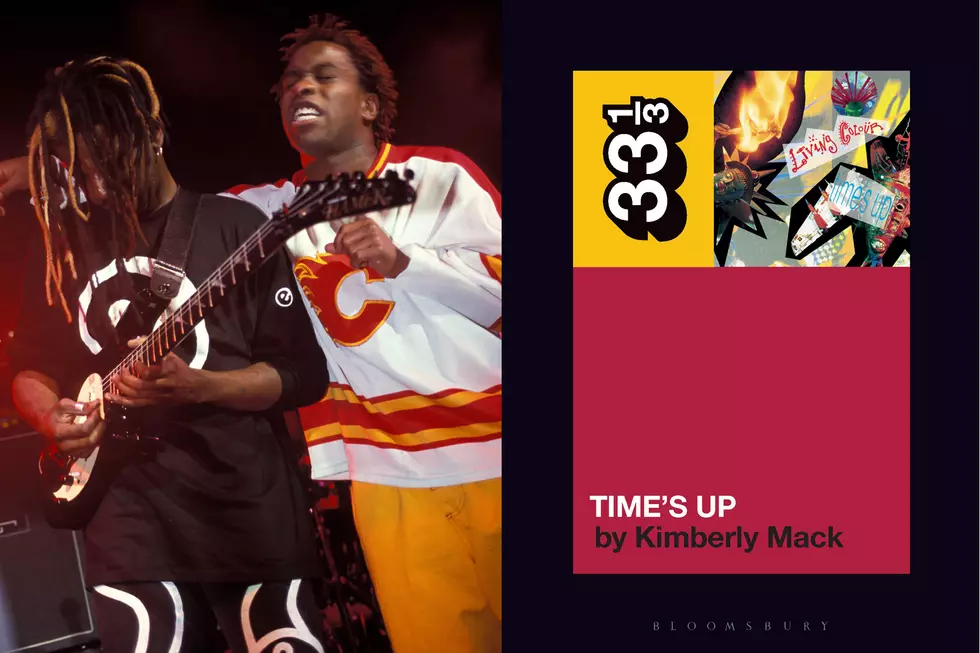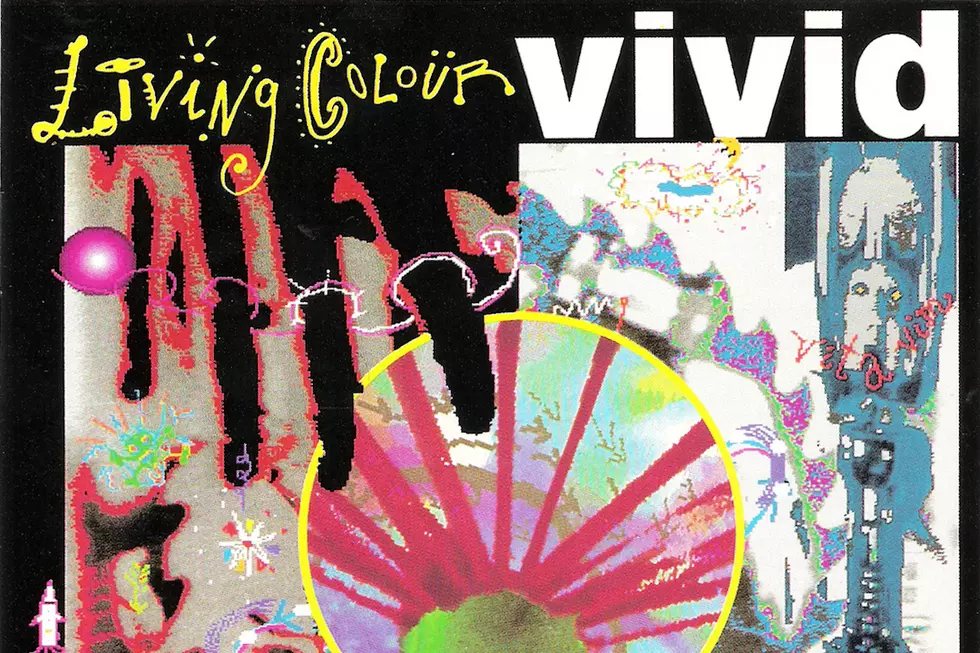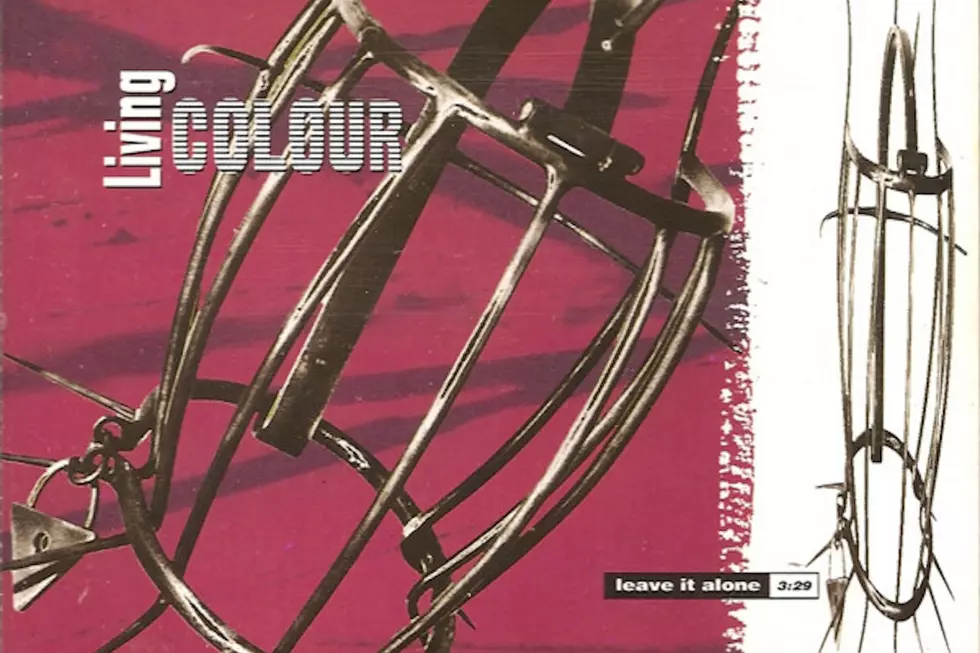
How Living Colour Crafted the ‘Black Sgt. Pepper’ on ‘Time’s Up’
It would have been easy for Living Colour to coast on the laurels of their hit 1988 album Vivid. Their profile rose thanks to positive press support, a Saturday Night Live appearance and heavy touring, including an opening slot on the Rolling Stones’ Steel Wheels tour.
But as writer Kimberly Mack details in a new book, the New York band fought hard for every moment of that success. Many things informed Time’s Up, Living Colour’s second album, which was released in August 1990. Musically, they continued to pull from a lot of different sources, ranging from punk to Van Halen, while continuing to use their platform to leave fans with more than just a good groove. “We wanted people to think about it,” drummer Will Calhoun told Mack.
Fans will appreciate the deep dive Mack takes in Living Colour’s Time’s Up, a new volume in the acclaimed 33 1/3 series. Band members, past and present, as well as associates, were interviewed extensively for the book, which presents track-by-track perspectives for each song, while also weaving in a critical analysis of the album and a retrospective look at how the band and its music were received at the time.
In the below excerpt, the members of Living Colour explain their intentions for their second album and what they wanted to accomplish post-Vivid.
Corey Glover (Singer): Some of those songs were written while we were on the road with the Stones. “Solace of You” was written on the road because we knew at the end of the Stones tour, we got to go into the studio and get some work done. Because if we don’t, we were going to miss an opportunity. Despite the success on the outside, that wasn’t what was happening on the inside. We were still struggling. We were still working class. And we couldn’t get rid of that idea. That’s not something we can ever get rid of. You cannot get rid of the fact that even if you were brought up middle-class, or even if you were brought up with some sort of privilege as African American men, and people in general, you still got to work hard for what you get. We have decided that we’re gonna have to work really hard at this.
Vernon Reid (Guitarist): We were charged with, and burdened on a certain level with, a feeling of responsibility that we couldn’t half-step. That’s a kind of oppressive state to be in. The idea that something has to be important is its own reaction to trauma.
Listen to Living Colour's 'Time's Up'
Muzz Skillings (Bassist): Vivid paved the way for Times Up. Like in the business sense, and in just a record label dynamic sense and the corporate sense, the success of that record and everything we brought to it paved the way for the second record. It set the tone and made it possible. But knowing that, you know, I wasn’t interested in building off of or continuing Vivid in any way. Our audience had grown. It grew exponentially from the time of Vivid’s release to when we were starting to record Time’s Up. The only thing on my mind that I was interested in was resonating with this new expanded audience. That was my goal. It was amazing and a blessing that they were there.
Glover: Vivid made a statement. We had more to say. And we felt like if we didn’t make another statement, we’d be stuck living in this little bubble. So we would talk about love as well as what one might call social issues.
Will Calhoun (Drummer): We wanted it to sound fucking incredible, and we wanted our musicianship to be high, and we wanted the impact to be challenging and earth-shattering. We didn’t want people to just sit down and drink wine to the record. We wanted people to think about it.
Paul Hamingson (Engineer): They had presented quite a lot to the world and got back a lot from the world on that first one. And that shaped the second one. It shaped the way that they were able to play. There’s a difference between a band that’s been on the road playing for a year in front of different audiences and what they can produce when you put them in a room.
Ed Stasium (Producer): From the moment we started rehearsing, I had a concept. I think the guys had a concept. We didn’t want to duplicate what had been done with Vivid. This turned into, as I called it, the Black Sgt. Pepper. It has a flow to it. We have all these soundscapes. Vernon had gone into, with his effects, all the different deep African roots and reggae roots and Afro-Caribbean stuff. And we do have the heavy rock stuff, but everything is intertwined with the soundscapes. Every song flows into each other starting off with “Time’s Up” with those clocks.
© 2023 Kimberly Mack, from Living Colour’s Time’s Up published by Bloomsbury Academic.
The Hilariously Bad First Concerts of Rock's Biggest Bands
More From Ultimate Classic Rock









